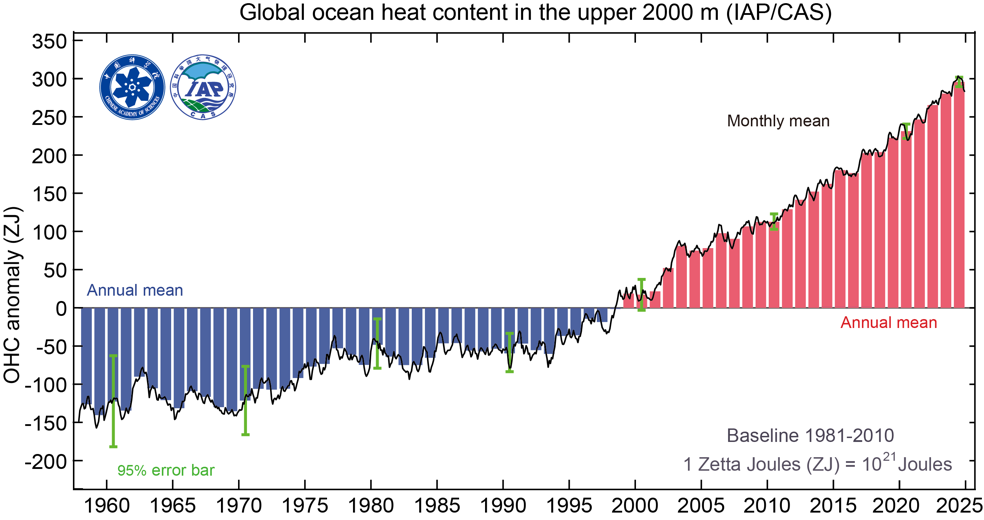
Newsroom
A new study published in Advances in Atmospheric Sciences has found that ocean warming in 2024 has led to new record high temperatures. The ocean is the hottest it has ever been recorded by humans, not only at the surface temperature but also for the upper 2000 meters.
"The broken records in the ocean have become a broken record," said Prof. CHENG Lijing from the Institute of Atmospheric Physics at the Chinese Academy of Sciences. He led a team of 54 scientists from seven countries and discussed how a hotter ocean affects our lives on land and what this means for our future.
The ocean is a critical part of the Earth's climate – most of the excess heat from global warming is stored in the ocean (90%) and the ocean covers 70% of the Earth's surface. Because of this, the ocean dictates our weather patterns by transferring heat and moisture into the atmosphere. The ocean also controls how fast climate change happens.
"To know what is happening to the climate, the answer is in the ocean," said Prof. John Abraham at the University of St. Thomas, co-author of the study.
Results from three international teams who collaborated on this project were consistent – the ocean is warming, and 2024 was a record.

The image shows one set of results for the upper 2000 meters ocean heat content (Image by the Institute of Atmospheric Physics). Blue and red colors refer, respectively, to whether a particular year was colder or hotter than the 1981-2010 period. This time period is used as a basis for scientists to compare against reference conditions. Green bars indicate the measurement accuracy. The central message is that the values have been increasing year after year after year.
From 2023 to 2024, the global upper 2000 meters ocean heat content increase is 16 zettajoules (1021 Joules), ~140 times the world's total electricity generation in 2023.
"OHC has increased steadily by 15~20 zettajoules over the past five years despite the La Niña and El Niño cycles," said Prof. Michael Mann from University of Pennsylvania.
The ocean surface temperature is also setting records. The surface temperature refers to temperatures just at the surface, where the ocean waters and atmosphere commute. Surface temperatures are important because they dictate how fast heat and moisture (humidity) can transfer from the ocean to the air and thus affect weather. The rise in surface temperatures since the late 1950s has been staggering.
The changes are not uniform; regional variations can be substantial. The Atlantic is warming along with the Mediterranean Sea, and across the mid-latitude Southern Ocean. While parts of the Northern Pacific Ocean have warmed very rapidly, other areas (the tropical region) have not, mostly due to the La Niña/El Niño cycle in that area. The heat has even accumulated near both the North and South Poles.

Antarctic sea ice at sunset. The ocean surrounding the Antarctic continent is experiencing one of the fastest warming rates. (Photo taken by BAN Chao on December 25, 2023)
A warmer ocean affects marine life and result in huge damage in many ways.
"The main way the ocean continues to influence the climate is through accompanying increases in water vapor in the atmosphere that leads to the damaging increases in extremes in the hydrological cycle. Water vapor is also a powerful greenhouse gas and increased heating leads to drying and risk of drought and wildfire. But it also fuels storms of all sorts and leads to risk of flooding. That includes hurricanes and typhoons," said Dr. Kevin Trenberth, a senior scientist at National Center for Atmospheric Research, USA, another member of the team.
For example, over the past 12 months, a staggering 104 countries have recorded their hottest temperatures ever. Droughts, heat waves, floods, and wildfires have impacted Africa, Southern Asia, the Philippines, Brazil, Europe, the USA, Chile, and the Great Barrier Reef, as just but a few examples. Since 1980 for example, climate disasters have cost the USA nearly $3 trillion.
The heat in the ocean is the best measurement for monitoring the changing climate. "The ocean is our sentinel for planetary warming, acting as the major sink of surplus heat accumulating in Earth climate system as a result of anthropogenic emissions," said Dr. Karina von Schuckmann at Mercator Ocean International, co-author of the study. If there continues to be a failure to take action to slow climate change, the disruption, unprecedented change and its implications, costs and loss and damages will continue to increase.
